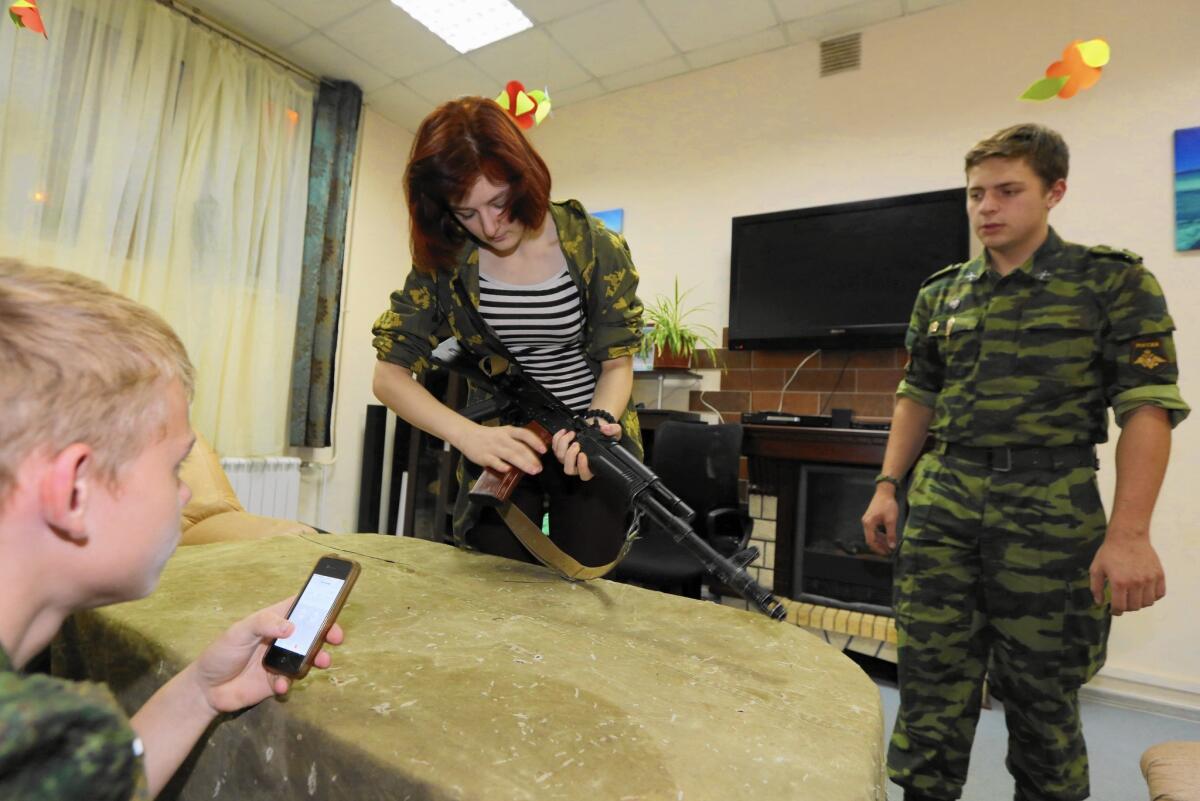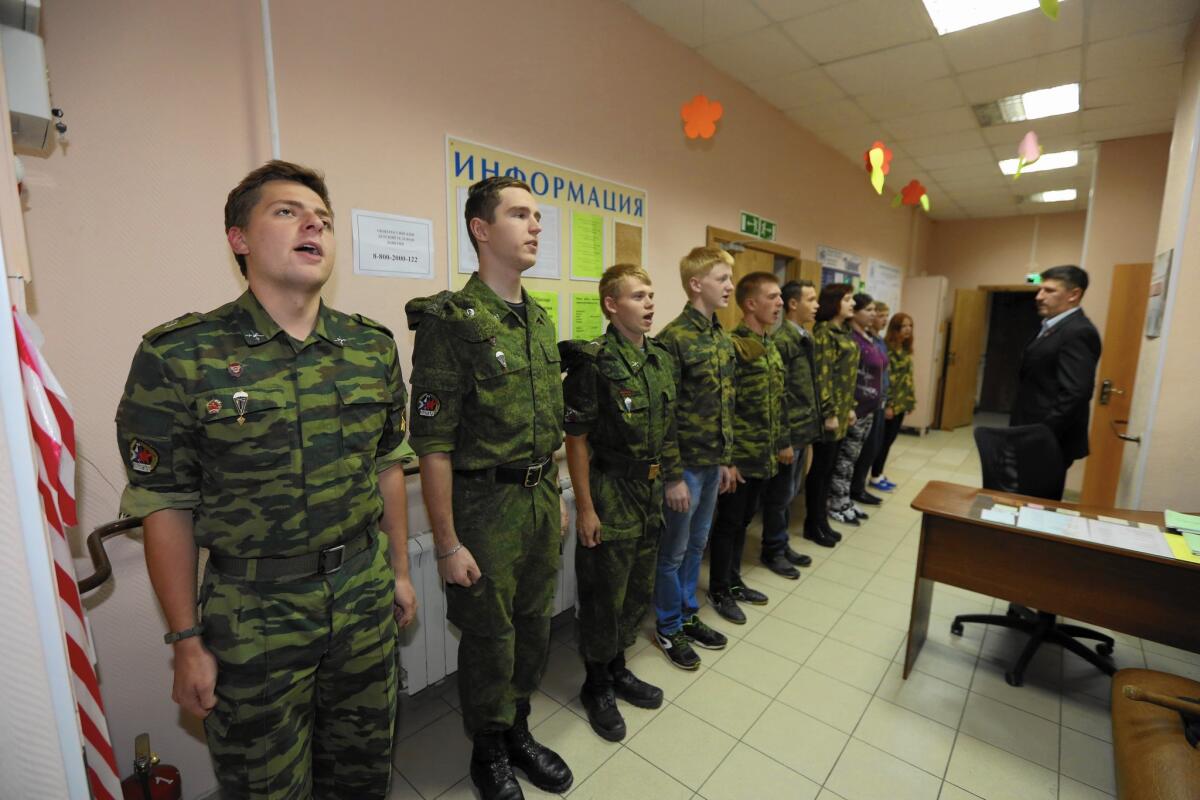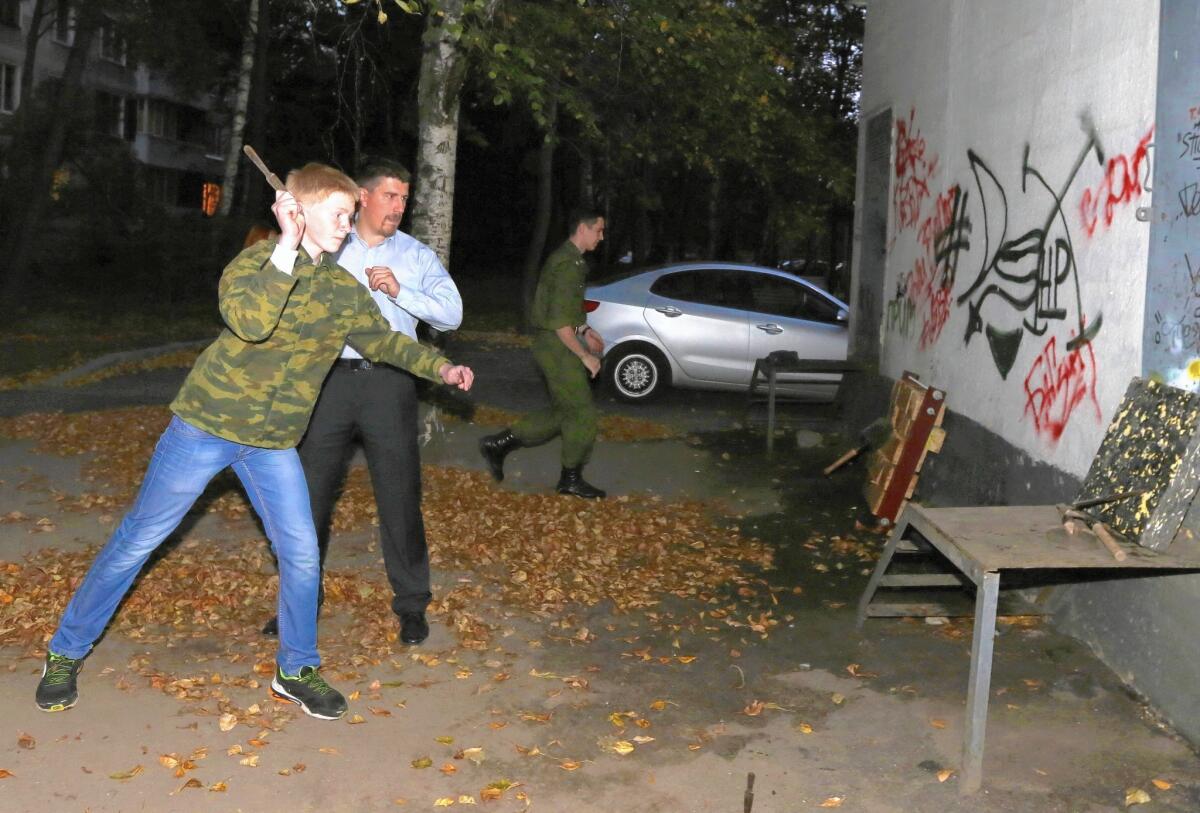Great Read: Russia’s military clubs for teens: Proud patriotism or echoes of fascism?

Margarita Maluchenkova, 18, disassembles an AK-74 assault rifle as part of a drill at the Our Army club in Moscow.
- Share via
Reporting from Moscow — In a playground outside a shabby warren of cinder-block apartments in north Moscow, children play on swings and climbing bars as Stepan Zotov instructs a squad of teens in knife-throwing nearby.
Thirteen-year-old Andrei Polivoi is aiming his knife at a foam cushion about the size and shape of a human chest that’s propped up on a metal stair landing. Four of his five throws miss and clatter noisily onto the stairs.
“Not bad for your first try — attaboy!” Zotov proclaims with an encouraging clap on the disheartened boy’s shoulder.
It’s been five years since Zotov founded Our Army, one of thousands of “military-patriotic youth organizations” answering President Vladimir Putin’s call for preparing the next generation of Russian soldiers as the Kremlin flexes its reinvigorated military muscle abroad.
“Service to the fatherland, military honor and fortitude are the best prevention against any socially dangerous conduct,” says the 30-year-old, a lawyer and activist with the nationalist Rodina party.

Members of Our Army, a club in Moscow that is one of thousands of “military-patriotic youth organizations” answering President Vladimir Putin’s call for preparing the next generation of Russian soldiers.
Inside the apartment complex, the five other members of the club gather unsupervised in a back room to practice breaking down and reassembling an AK-47.
“One minute, 32 seconds — ha! I beat you by one second!” a triumphant Margarita Maluchenkova, an 18-year-old with crimson-tinted hair, proclaims after timing the last of her male club mates with the stopwatch on her smartphone.
The Kalashnikov is unloaded for the drill — a good thing, considering that the teens appear to have had no instruction in the safe handling of weapons. They absently point the muzzle at other club members seated around a table watching the practice. They peer into the barrel from the business end to see whether the reattached cleaning rod is in alignment.
Maluchenkova, frustrated that the curved magazine won’t snap into place, gives the cartridge a sharp smack on the table.
“I like handling guns, though it’s more interesting when they are loaded,” she says.
Maluchenkova — decked out in a green camouflage jacket, a sailor-stripe tank top, purple leggings and suede boots with 4-inch heels — says she joined Our Army in hopes of gaining an advantage in the stiff competition to get into fighter pilot training.
“Being up in the sky — that is challenging and dangerous. It reveals a person’s real character. I love such situations and am not afraid,” she says.
She believes Russia stands tall in the world.
“Every country should have its own strong army, to be prepared,” she says. “Every person should be ready to contribute, to be capable of some skill that is useful to the country.”
I like handling guns, though it’s more interesting when they are loaded.
— Margarita Maluchenkova, Our Party member
::
Clubs such as Our Army have been cropping up across Russia at a fevered pace amid heightened tensions with the West and with former Soviet republics that have defected from Moscow’s orbit. In just two years, the loosely aligned groups have grown to involve hundreds of thousands of Russian youths between the ages of 13 and 18, their organizers boast.
At weeknight drills and weekend field trips, the teens undergo fitness training and instruction that give them a taste of military regimen as they prepare for armed forces careers or, for 19-year-old men, their year of compulsory military service.
The military has been experiencing a renaissance in recent years as the government spends billions to modernize and looks to its upcoming conscripts to fend off Western enemies the Kremlin sees as encroaching on Russian borders.
“There is a new popularity of patriotism after Crimea that is bringing recognition to our cause,” says Zotov, referring to Russia’s annexation of Ukraine’s Black Sea territory last year.
The Crimea gambit has brought the wrath of the democratic world down on Russia in the form of sanctions that have blacklisted dozens of senior Kremlin officials and cronies and deepened an economic crisis brought on by fallen oil prices. But the Russian public has cheered Putin’s military interventions in Georgia, Ukraine and now Syria.
“We have always had enemies abroad,” Zotov says. “You should know your enemy, and, make no mistake, we do consider the Western world an enemy, especially America. That is the most dangerous threat to our future.”
Zotov disparages the attempts of previous post-Soviet leaderships to integrate Russia in the community of democratic nations. He contends the West has been corrupted by the vices of liberalism: gay marriage, decline of the traditional family, crime and substance abuse.
“We don’t teach hatred, though hatred can be a powerful force,” he acknowledges.
Kremlin critics and democracy advocates, though, see ominous echoes of World War II fascism in the rising popularity of the youth groups.

Stepan Zotov offers knife- and spade-throwing instruction to members of Our Army, a paramilitary youth group, in north Moscow.
“You need to read books about Italy and Germany in the 1920s and ‘30s to understand how this compares with today’s state of Russian society,” says Maxim Trudolyubov, a scholar at the Wilson Center in Washington and editor at large of the independent daily Vedomosti in Moscow.
He refers to Umberto Eco’s 1995 treatise on the 14 features of “Ur-Fascism,” among them the cult of tradition, rejection of modernism and everyone being taught to become a hero.
“Russia has every single one of these features in place,” Trudolyubov says. “Being healthy and sporting is good for everyone — there’s no argument about that. But in what context does it develop?”
::
A crumbling stucco building stands at the edge of what used to be a paratrooper practice field, now hosting a soccer stadium and a thicket of billboards. Inside the headquarters of the 88-year-old Volunteer Society for Cooperation with the Army, Air Force and Fleet, Igor Filimonov describes the ascendant youth clubs as a revival of proud tradition.
“It used to be that those newly inducted into the army learned how to use a Kalashnikov or drive an armored vehicle in basic training. So those who get this experience before their service have an advantage and can advance sooner than the rest,” says the communications chief for the organization, which counts 300,000 members.
An ROTC-like program founded during Josef Stalin’s rule, the prep schools for soldiers and spies all but died out in the 1980s, when the demoralized Soviet Red Army was mired in a costly and unwinnable war in Afghanistan and military careers were a sentence to poverty and hardship. Respect for the armed services continued to decline after the 1991 breakup of the Soviet Union.
Filimonov invokes the lawless years after the Soviet breakup as a cautionary tale for citizens who neglected their devotion to the motherland.
“The situation is changing now. Our country is restoring its former strength and in a sense becoming a major power again,” Filimonov says. “It’s a normal and natural process when young people understand that the state gives them a free education and the means to make a living, and for that they pay a debt to society by serving in the army.”
Gone are the days when soldiers had to beg for food from Russians living near their bases, Filimonov says.
“It’s trendy now to be seen with epaulets on your shoulders.”
You need to read books about Italy and Germany in the 1920s and ‘30s to understand how this compares with today’s state of Russian society.
— Maxim Trudolyubov, Wilson Center scholar
::
At the former Young Pioneers Palace in the Sparrow Hills on Moscow’s southern flank, Olga Korovatskaya schedules facilities for 80 youth groups vying for use of the gyms, soccer fields and running tracks.
Sports competition is the essence of preparation for military life, she says in her office. She sits beneath a portrait of Putin, whose public displays of martial arts training, skiing, hockey and other fitness pursuits have set an inspiring example for young Russians, she says.
“Vladimir Putin is a star in the eyes of Russian children,” she says.
The clubs are sponsored by a wide array of political and social organizations, from the Russian Orthodox Church to the imperial-era Cossack militia. They’re still in the infancy of being brought into a cohesive network, but this summer the Kremlin put the Defense Ministry in charge of uniting the pre-service prep schools and pledged millions in funding for the youth organizations, Korovatskaya says.
Support from the Kremlin — and Putin — has elevated the image of the military profession, she says.
“In Soviet days,” Korovatskaya says, “every girl dreamed of marrying an officer.”
::
“One! Two! One! Two! One! Two! One! Two! One! Two!”
At the Our Army clubhouse, the teens count off into two squads for assault training, the “twos” taking a synchronized step forward, heads snapping to the left, eyes fixed on an unseen point in the distance.
Cardboard boxes of weapons and equipment are stashed against the walls and in cupboards: spades, hatchets, air rifles and flak jackets, available for instruction in defensive and offensive action.
The after-school training three nights a week is a sort of dues to be paid before weekend visits to a shooting range or an airfield for parachute practice.
Andrei, the youngest of Zotov’s recruits, is eager for his first visit to the airfield.
“It’s my dream,” he says, “to see the Earth coming up at me.”
MORE GREAT READS:
Retailers exasperated -- and empathetic -- over number of homeless at Sylmar strip mall
Tethered by a string and trust, a blind sprinter and his guide make history
In India, the slow (slow) death of a black-and-white film maker
More to Read
Sign up for Essential California
The most important California stories and recommendations in your inbox every morning.
You may occasionally receive promotional content from the Los Angeles Times.














